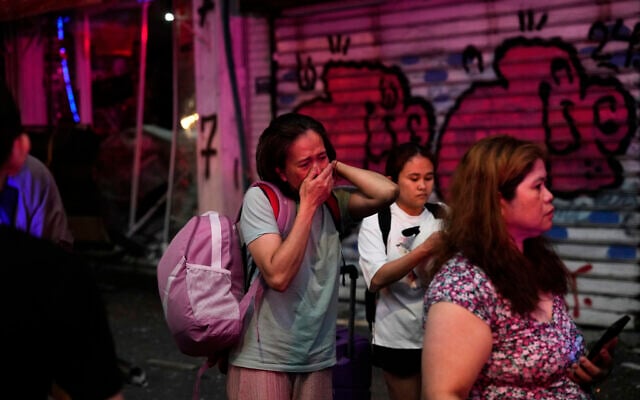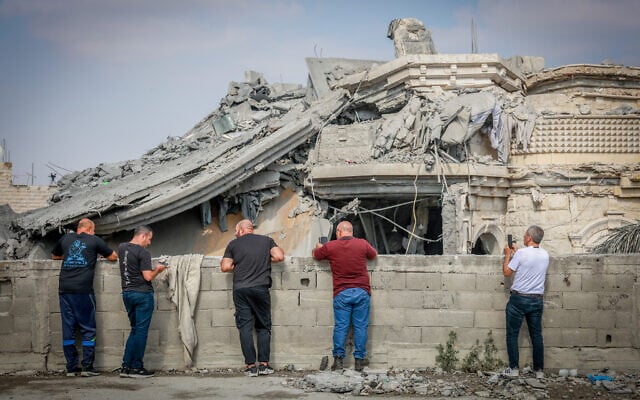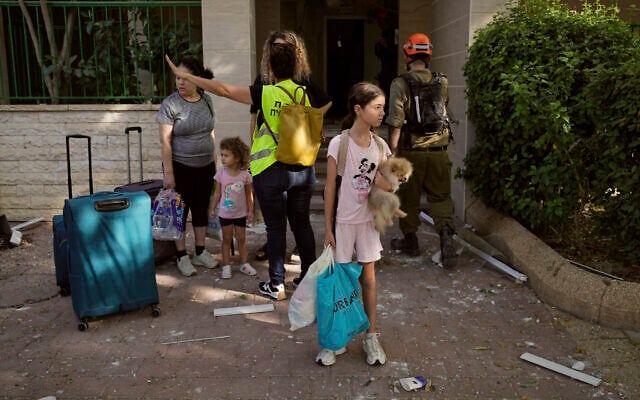


A report from the Public Complaints Commission of the State Comptroller’s Office published on Wednesday revealed significant challenges faced by civilians and government institutions during Operation Rising Lion, the 12-day military campaign launched on June 13 to neutralize Iran’s threat to Israel.
The report, based on field visits, hotline operations, and assistance desks for those displaced by the war, underscored both the resilience of the civilian population and systemic shortcomings in the state’s emergency response.
Throughout the conflict, triggered by Israel’s Operation Red Wedding — in which some 30 top Iranian military commanders were eliminated in near-simultaneous strikes in Tehran as the war began — Iran fired hundreds of ballistic missiles at Israeli cities.
As a result, 31 civilians were killed in Israel, many were injured, and tens of thousands of homes were damaged. Approximately 11,000 residents were evacuated to hotels and guesthouses across the country. Despite the disruption, the report noted, the public demonstrated extraordinary resilience amid widespread harm to life and property.
From June 15, the state comptroller, the public complaints commissioner, and senior staff toured missile impact sites, hospitals, and evacuee accommodations to assess government response in real time. These visits aimed to observe the scale of destruction, gauge the effectiveness of state services, and hear directly from residents about their hardships and experiences.
On June 16, the Public Complaints Commission launched a hotline for individuals struggling to realize their rights. Accessible via phone and WhatsApp in Hebrew, Arabic, Russian, Amharic, French, and English, the hotline handled approximately 530 inquiries. Commission staff provided guidance in filing claims, assisted with navigating bureaucratic processes, and directed callers to relevant public agencies.

Two days later, the commission established reception desks in 28 hotels and guesthouses housing evacuees. Staff encountered residents facing dual challenges: the physical loss of property from missile strikes and the bureaucratic complexity of securing compensation, temporary housing, and other entitlements. Many evacuees expressed feelings of “helplessness” after having “fallen through the cracks,” especially vulnerable populations such as the elderly and disabled, bereaved families, and single parents.
At these desks, staff offered real-time solutions, collected complaints, and helped cut through bureaucratic red tape, leveraging the commission’s legal authority and direct connections with officials to expedite resolutions. Of the 303 complaints formally opened during the operation, 51.7 percent were resolved in favor of complainants, while a total of roughly 700 inquiries were handled through hotlines and assistance desks combined.
The report divided complaints into two main categories. The first concerned people directly harmed by missile fire, particularly those evacuated to hotels and guesthouses. Many complained of delays in compensation claims, low damage appraisals, uncertainty regarding the length of hotel stays, and bureaucratic obstacles in securing financial aid or alternative housing.

The second category reflected broader public hardships during the operation, including gaps in protective shelters, restricted access to health services, unemployment-related difficulties, and general disruptions to public services. Inspectors found that many public shelters were locked, poorly maintained, or otherwise inaccessible, and in some cases, private individuals had illegally occupied protected spaces, preventing neighbors from using them during alarms.
A major finding of the report was that the country lacks a single national authority to coordinate government responses to citizens affected by emergency. While the National Emergency Management Authority and other agencies were tasked with coordinating assistance, municipalities reported having to negotiate independently with hotels and handle logistics without uniform guidance. This led to significant disparities in hotel rates and criteria for evacuation, creating stress and inequities for evacuees.
For residents whose apartments were officially deemed uninhabitable, short-term solutions included hotel stays funded by the Property Tax Compensation Fund or temporary stays with relatives supported by a grant of NIS 4,000 ($1,200) for up to two weeks. Long-term options allowed residents to find rental housing independently, with reimbursement from the Compensation Fund.

However, uncertainty about the duration of funded hotel stays, approval processes for extensions, and online applications for exceptional cases contributed to widespread anxiety and instability. The Compensation Fund itself faced criticism for slow processing, low appraisal estimates, miscommunication with claimants, and a lack of flexibility. Non-citizens living in Israel were largely excluded from compensation, further highlighting gaps in the system.
Defense Minister Israel Katz declared a nationwide state of emergency on June 13, lasting until June 24. The declaration led to the shuttering of educational institutions, cancellation of public events, closure of civilian airspace, and restrictions on workplaces aside from essential services. These measures brought the economy to an effective standstill and compounded civilian hardships, especially for those already displaced or otherwise affected by missile strikes.
On June 18, the government instructed the National Emergency Management Authority to coordinate inter-ministerial efforts, remove bureaucratic obstacles, and provide financial aid to localities with damaged homes.
The National Digital Bureau, responsible for digitizing governmental services and stimulating economic growth, was tasked with creating a data management system for evacuees, and the ministries of housing and finance were instructed to plan long-term housing solutions. Nevertheless, operational gaps remained, with municipalities left to manage evacuation and housing independently, often negotiating directly with hotels and creating disparities in costs and access.

In the report, State Comptroller Matanyahu Englman made several key recommendations to strengthen Israel’s preparedness for future emergencies. He called for the establishment of a national coordinating authority to oversee evacuation, housing, and assistance for affected civilians, along with a centralized information center to provide reliable updates and handle residents’ requests efficiently.
The government was urged to develop structured, budgeted evacuation plans with uniform standards for hotel contracts, eligibility, and accessibility for vulnerable populations. The Compensation Fund should simplify and accelerate claims processes, ensure fair appraisals, and introduce flexibility in compensation tracks, with clear eligibility guidelines for all residents, including non-citizens, the report said.
It also advised municipalities to maintain public shelters, ensure they are clean, accessible, and usable, and inspect protected spaces in advance of emergencies. Finally, government offices were told to put together contingency plans for continuity of services and adequately staffed hotlines during crises.
Englman emphasized that these reforms are essential for protecting Israeli residents in future crises and preventing the hardships and inconsistencies revealed during Operation Rising Lion.

